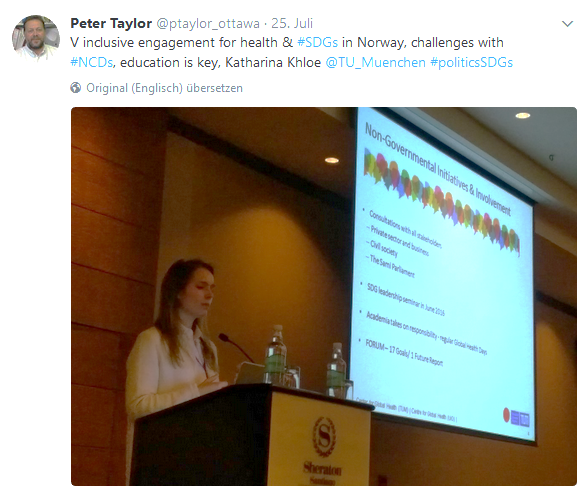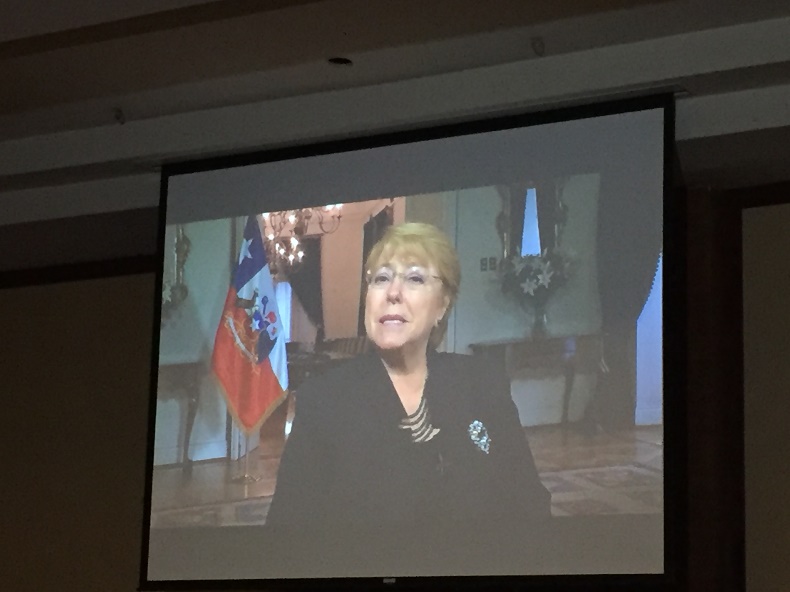For three days the conference, organised by the Chilean Government, Think_SDGs, PAHO, ALASAG, the Global Health Centre of the Graduate Institute in Geneva and IDRC, brought together a South-American dominated but still international group of politicians, policy and health researchers and dataphiles.
Day 1
Around 100 participants assembled on the first day. All talks and presentations of the first half of the first day were accessible via livestream online, as well as they were streamed into waiting rooms in public hospitals across the country.
Dr Tito Pizarro, chief of the Public Policy Division of the MoH inaugurated the conference and presented the high-level attendees and organisers of this 3-day event. In addition to the Ministers and their Undersecretaries, co-organisers of the event Ilona Kickbusch from the Graduate Institute Geneva and Peter Taylor from the IDRC were welcomed, as was Kira Fortune, representative of PAHO.
From the very beginning, all Chilean representatives stressed that the country was extremely committed to the 2030 Agenda. Chile also presented its voluntary review to the High Level Political Forum in New York in 2017 to review progress on SDGs. The government takes the SDGs very seriously and states that it will comply. The transparency and commitment to stream this conference so publicly may be a case in point.
The next session looked at regional and global initiatives to catalyse support for the SDGs and health. Contributions came from CEPAL (Economic Commission for Latin America and the Caribbean), SDPI in Pakistan, PAHO and Fiocruz in Brazil.
CEPAL focused on a discussion on the indicators and targets and the importance to measure progress, while at the same time acknowledging that different countries have different capabilities when it comes to the percentage of targets that can be measured. Despite varying capabilities, it was stressed that everyone would have to move out of their comfort zone.
PAHO emphasised that health must play a role in all policies, not just those that explicitly focus on health. Latin America is the first region to have a plan of action on this approach / commitment. Furthermore, partnerships in the PAHO region are very important for success.
An important message coming from Southeast Asia was that although everyone is trying to raise awareness and address SDGs at a high political level and although many initiatives exist, translation into action is slow.
In the afternoon, a new panel looked at national initiatives and good practices. It was explicitly noted that this panel was made up of four women and only one man, to the great pleasure of Ilona Kickbusch who launched the Women in Global Health initiative, as well as other conference participants who have committed to not speaking in panels made up of men only.
This panel presented initiatives across Latin America (CEPEI), Sri Lanka (IPS), Mexico, Ethiopia (Organisation for Social Science Research in Eastern and southern Africa, OSSREA) and Norway (Centre for Global Health, University of Oslo). An important aspect was again the availability, quality, timeliness and role of data as well as the importance of statistical capacity in countries to deal with data.
The presentation on Norway was very well received since it was the only presentation about a high-income country showing what processes and initiatives are made possible in the global north. In particular, the commitment to making SDGs part of school curricular received great attention.
Key messages of Day 1 were:
- In Chile, as well as in Latin America, SDG 16 plays an extremely important role – while this conference had a focus on health, it became clear that SDG 3 was nothing without SDG16 and that every progress in health is driven by or only possible when equality and true democracy are ensured
- This meant that empowerment of civil society was also mentioned time and again and is seen as crucial in SDG implementation
- How can societal aspects collide with individual aspects? How to move beyond the ceiling that has been reached following activities to fulfil MDGs in terms of civic engagement?
- There are 4 key goals in Chile, with regards to SDGs:
- Inclusive and sustainable growth
- Decrease in poverty and inequalities
- Take care of climate change and protect the biodiversity, as well as to promote innovation
- Strengthen institutions and democracy
- The SDGs are an agenda for cultural change – since we cannot continue as we have done
- SDGs are trying to be an answer to the question: “how do we want to live, what makes our future”?
- The SDG agenda is indivisible – no goal can be left behind / ignored
- Be innovative, think outside of the box in the ways in which we work together
- There is a danger in being slow in the implementation of the SDGS – this will be measurable in the numbers of lives lost
- “leave no one behind” – ensure this concept is actually driving all activities
- It is no longer about nation states; the initiatives of cities to do something for planetary health show that other large-scale bodies can become active themselves
- Importance of data
- It cannot be an elite conversation
- Do adolescent and mental health have to feature more explicitly in the SDGs and receive more attention given that both issues seem to be increasing in many countries?
Day 2
The first half of the second day built on the experiences of the participants and encouraged direct exchange about selected topics in the form of workshops. Each workshop was mediated by one spokesperson and the results of the discussions were presented after the lunch break:
1)
- Researchers need to carry out more inter & transdisciplinary work
- There is a need for a matrix that facilitates reporting on the indicators
- A transparent process of engagement needs to translate findings into policy
- High quality data needed
- Independent technical advice is desired for SDG implementation
2)
- Funding is an issue to implementation of all SDGs
- We ned synergies across sectors to facilitate this
- Sustainable strategies for funding are important to ensure continuity and not divert energy to continuously search for new funding
- Ministries and politicians have to be involved from the beginning – as they make the decisions at the end
- Funding for SDGs on health should be seen as an investment and not a dispense
3)
- Promotional community participation
- Distrust installed in citizens with regards to public activity
- We need to shape individuals to take part actively
- Use social media
4)
- Work on data availability and exchange
- Establish what data is actually needed and be concrete when requiring and asking for data
- Start with the development of competence
- Lack of feedback on what has been done with the information
- How can we ensure the data collected reaches the policy makers
- Data should become information, which should become evidence
- Use the data, understand it, and apply it
- Organise the data in a way that it can be consulted – data organisation and management
In a discussion that proceeded from these summaries, important points were raised:
- Need to define adequate indicators that can be measured and evaluated – collect data from there
- We are a minority – most people don’t know about the SDGs
- People need to know what happens as a result of their engagement
- Engagement is not a given and they want to know it is useful that they are active / what is the result of their energy & time
- There are many who technically are not marginalised but feel marginalised
- Think about the values, purpose and ethics of civic involvement
- Building of trust between stakeholders
- The key terms / principles that were defined during the discussions were:
- Inclusiveness
- Transparency
- Accountability
The summaries led into a discussion and reworking of the pre-prepared Santiago Declaration. The Declaration is based on two years of exchanges with policy makers, policy researchers, health organisations etc., to guide future commitments and activities and highlight to the wider SDG community and globally what participants of this conference stand and work for.
Day 3
The final day of the conference was of political and public nature, indicating how important the Chilean government considered this event and their role in it to be. A video message by the Chilean President Bachelet was shown, in which she congratulated  the delegation on the success of reaching this Declaration and lauding everyone for their commitments to achieve the SDGs.
the delegation on the success of reaching this Declaration and lauding everyone for their commitments to achieve the SDGs.
Ilona Kickbusch discussed “The Commercial Determinants of Health”. During her talk, IK covered six commercial determinants of health that she considers toxic: 1) products; 2) environments; 3) marketing; 4) investment; 5) trade; 6) waste. She highlighted the important role SDG 12 plays for health (SDG 3) and emphasised the quote by Prof Pretty (University of Essex) “the most political act we do on a daily basis is choosing what to eat”. The issue of normalcy was also raised and in the discussion that followed it was reiterated that a lot of health, food and consumption-related behaviours and standards we now consider normal and that thus difficult societal changes are required if we are to change the situation.
In the afternoon, a Think_SDGs meeting also took place, in which members of this global network that work towards the implementation of the SDGs came together to discuss working relations as well as next steps. The key messages here concerned the “1000 days of SDGs” conference that will take place in Geneva in December, as well as the opportunity to publish more easily with BMJ as well as to post blog posts with BMJ. In each region there should be a hub organising activities, following up on commitments and working on further raising awareness of SDGs.
